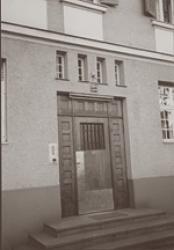In the Nick of Time
 Michael Ende and his mother move to Ainmillerstraβe
Michael Ende and his mother move to AinmillerstraβeThe first of the ‘Jim Button’ novels appeared in 1960. It went on to win the German Prize for Children’s Fiction - to the author’s considerable surprise.
The morning of the announcement Michael Ende experienced something that he later described as a ‘literary bombshell.’ He had just heard that his landlady would be seeking legal redress for seven-months of unpaid rent, when the telephone rang. His novel Jim Button and Luke the Engine Driver had won the German Prize for Children’s Fiction. Ende could scarcely believe it: ‘To be honest, I hadn’t realized that a Children’s Prize existed. All I could ask was: “How much is it?” The voice on the other end of the line said: “I’m afraid it’s not very much - just five thousand marks.” […] It was more than I’d ever earned in my life. Then the voice continued: “But the prize will work as a kind of advertisement. Your book will be displayed in all the shop windows. You‘ll soon see.” ’ In a flash, Michael Ende’s financial situation and career had changed dramatically. After the awards ceremony, the author embarked on his first reading tour and was away for six weeks.
Michael Ende and his mother found a new flat on the corner of Siegfried and Herzog streets and moved in right away. That year Jim Button was nominated for the Hans Christian Andersen Prize and received the Berlin Literary Prize for Youth Fiction.
The second ‘Jim Button’ novel, Jim Button and the Wild Thirteen, was published in 1962. Both books were serialized on radio and TV, and the Augsburg Puppet Theatre famously adapted the novels in a version filmed by Hesse’s broadcasting corporation. The print-runs sold out so rapidly that K. Thienemanns could barely keep up. Translations into numerous foreign languages soon followed.
Michael Ende’s success as a novelist gave him a measure of financial stability, and he was able to stop working for radio and devote himself to his original ambition of writing for the stage. It was during this time that he started work on his play Die Spielverderber (‘The Spoilsports’).
Before long the Endes moved again - the flat in Siegfriedstraβe had become too noisy for them, so Ende and his mother moved to no. 15 Ainmillerstraβe. In 1963 Edgar Ende was awarded honorary membership of the Academy of Arts in Munich. During that year he and his companion Lotte Schlegel moved to Netterndorf, some thirty kilometres to the west of Munich. Their new home was a former schoolhouse.